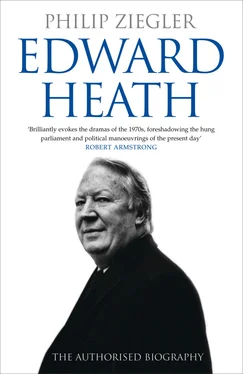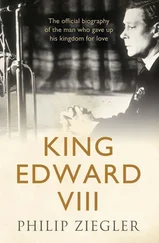Though he is said to have told his old acquaintance and future opponent, Ashley Bramall, that he was still uncertain whether he wanted to take up politics, 23he never doubted that if he did so it would be as a Tory. But in 1945 the disillusionment which he had expressed on the journey back from the United States still lingered. He believed that the old Conservative Party survived unregenerate, governed, as it had been before the war, by ‘stuffiness, dead convention, stultifying distinctions’. If, as almost everyone assumed would be the case, they were returned to power on the coat-tails of Churchill’s popularity, then these attitudes would survive unchanged. A period of opposition would give the modernisers a chance to take control of the party and reshape its thinking and its principles. He did not expect, still less hope for, the landslide Labour victory of 1945, but there was some comfort to be drawn from it. Certainly he rejoiced that he had not personally been involved in the debacle.
He had one last searing experience before he returned to England and civilian life. In February 1946 he drove across a shattered Germany to Nuremberg, where the trial of the Nazi war criminals was in progress. In the dock were those leaders whom he had seen or even shaken hands with eight years before. Then they had been rulers of Germany, soon to be rulers of the continent; now they were reviled and tragic figures. In the meantime, Europe had been almost destroyed. Somehow it must be made impossible for this to happen again. ‘My generation did not have the option of living in the past: we had to work for the future…Only by working together right across our continent had we any hope of creating a society which would uphold the true values of European civilisation.’ Heath’s vision of a united Europe had been formed before the war but it was in Germany in 1945 that it found its full realisation. 24
FOUR In Waiting for Westminster
‘I now so often have the feeling’, Heath had written on the way back from the United States at the beginning of 1940, ‘that I’ve a lot of energy, power, ambition, and so on, and yet nothing to which to harness it. Is this, I wonder, because I’ve got so many things I haven’t thought out and that, when I’ve done that, I shall see the way to go? Or am I just blasé?’ 1Blasé was certainly not something which Heath could have been accused of being at any point in his life. To most people in 1940 he had appeared impressively clear-headed and decisive. His inner uncertainty, his doubt as to where he should go and how he should get there, were largely kept to himself: unconfiding by nature, he was least of all inclined to expose his weaknesses, even to those few whom he trusted fully. By 1946, to a large extent, those doubts had been resolved. He knew that he wished his long-term future to lie in politics; that the Conservative Party, for all its imperfections, was the only institution that offered him a chance to realise this ambition; that within that party his loyalties would lie with the left, reforming wing. The war had confirmed his belief in his own powers and helped him decide where those powers were to take him. He was tougher and more effective in 1946 than he had been six years before. It was perhaps symbolic of his evolution that the cosy ‘Teddy’ of pre-war years had now become a starker, sterner ‘Ted’. Not all his old friends made the change, even among new acquaintances some still preferred the earlier form, but by 1946 ‘Ted Heath’ had established itself as the address most usually employed. It was to remain so until his death.
His family never fully recognised the change. It was Teddy Heath who returned to the family home in Broadstairs. Even more than before the war he was the centre of attention. William Heath’s business was prospering in the post-war building boom and it was no longer necessary to take in paying guests. For the first time, Teddy and his brother, John, had separate rooms. But John had slipped still further from centre stage. To his father’s disappointment he had refused to join the family firm and had instead taken a job in a local radio shop. Within a year he had become engaged and was moving out.
The marriage lasted only a few years. John’s wife, Marian, maintained that Teddy Heath was the be-all and end-all of his mother’s and, to a lesser but still considerable extent, his father’s life. There were only two comfortable chairs in the kitchen/living room: Teddy would commandeer one while his mother sat knitting socks in the other. ‘She was always knitting socks.’ William and John helped with the washing-up; Teddy was never expected to join in. Everyone had to dress for breakfast except Teddy, who was allowed to come down in his dressing gown. His mother waited on him hand and foot: ‘I’ve seen her sitting there cracking nuts for him so that he wouldn’t have to crack them himself.’ 2
Teddy was ‘very clannish’ and expected the family to do things together, wrote Marian. It was always he who had the final choice as to what was to be done. On one occasion she revolted and, even though Teddy favoured a family picnic, insisted that she and John should go on the river with some cousins. ‘When I say we quarrelled, it was a case of Teddy and I crossing swords while the rest of the family sat around in awe-struck silence.’ He did not share the same circle of friends as John and Marian and was often to be seen striding along the cliffs or seafront immersed in thought. Such friends as he had in the neighbourhood were noticeably more mature – except for an occasional game of tennis he had little to do with the young. ‘My father was once invited to lunch with the Heaths,’ wrote Marian, ‘and was astounded to find Teddy walking in and out of the room without seemingly seeing anyone. He was so wrapped up in his thoughts and plans for the future.’ He was not ungenerous – more often than not he paid if they went to the cinema or on some similar outing – but Marian was told by Mrs Heath to make nothing of it: ‘Teddy hates to be thanked, he gets embarrassed,’ she explained.
When John and Marian were married, Teddy was best man and made what Marian remembered as a ‘most amusing speech’. There were no bridesmaids, so, he said, he felt in no way committed: ‘I might add that he was the only one not to kiss the bride.’ Kay Raven would certainly have been among the family friends at the wedding. ‘She was looked on by all as Teddy’s girlfriend,’ wrote Marian. ‘It was a strange relationship. Teddy never seemed very attentive, yet she didn’t seem to mind.’ She minded more than appeared but she had to put up with what she could get. John Heath never believed that there was any serious romance between his brother and Kay; so far as Teddy, at least, was concerned, it was ‘a bit of a smoke screen’ which provided him with a convincing reason for not forming a relationship with any other woman.
Broadstairs provided a convenient base to which he could retreat, but there was no question of Heath seeking a job in the neighbourhood. Politics were his long-term ambition and he hoped the wait would not be very long. His plan was to have found a seat before the next general election. By that time he would be 35 or thereabouts. But in the meantime he had to earn a living, ideally a living in a career which he could continue part-time when he had become a Member and which would pay enough to enable him to make some savings. Though he says in his memoirs that the scholarship to read law at Gray’s Inn which he had nearly secured before the war was still available, it does not seem that any specific promise had been made. Even if it had been, he had decided that the law was ‘rather dry’ and that it would take him five or six years to earn a modest salary. 3Academic life, even if he had been suited to it, was hardly the ideal jumping-off ground for politics. The Master of Balliol tried to fix him up with a job as personal assistant to the Regius Professor of Medicine at Oxford; Heath had his doubts about this, the Professor had still more and looked elsewhere. One problem was that Heath made no secret of his political ambitions and this discouraged possible employers who were looking for a longer-term commitment. He could have been Meetings Secretary at the Royal Institute of International Affairs at Chatham House – a post which would have brought him into close contact with many leading politicians – but when they realised that they might only have the benefit of his services for a few years, they lost interest.
Читать дальше












